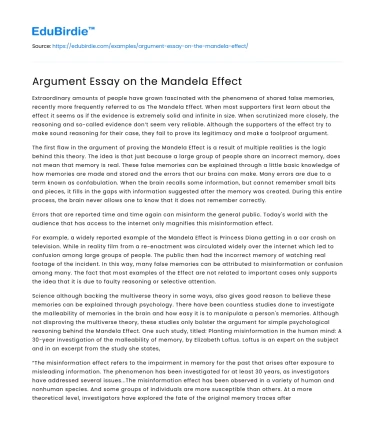Extraordinary amounts of people have grown fascinated with the phenomena of shared false memories, recently more frequently referred to as The Mandela Effect. When most supporters first learn about the effect it seems as if the evidence is extremely solid and infinite in size. When scrutinized more closely, the reasoning and so-called evidence don’t seem very reliable. Although the supporters of the effect try to make sound reasoning for their case, they fail to prove its legitimacy and make a foolproof argument.
The first flaw in the argument of proving the Mandela Effect is a result of multiple realities is the logic behind this theory. The idea is that just because a large group of people share an incorrect memory, does not mean that memory is real. These false memories can be explained through a little basic knowledge of how memories are made and stored and the errors that our brains can make. Many errors are due to a term known as confabulation. When the brain recalls some information, but cannot remember small bits and pieces, it fills in the gaps with information suggested after the memory was created. During this entire process, the brain never allows one to know that it does not remember correctly.
Save your time!
We can take care of your essay
- Proper editing and formatting
- Free revision, title page, and bibliography
- Flexible prices and money-back guarantee
Errors that are reported time and time again can misinform the general public. Today's world with the audience that has access to the internet only magnifies this misinformation effect.
For example, a widely reported example of the Mandela Effect is Princess Diana getting in a car crash on television. While in reality film from a re-enactment was circulated widely over the internet which led to confusion among large groups of people. The public then had the incorrect memory of watching real footage of the incident. In this way, many false memories can be attributed to misinformation or confusion among many. The fact that most examples of the Effect are not related to important cases only supports the idea that it is due to faulty reasoning or selective attention.
Science although backing the multiverse theory in some ways, also gives good reason to believe these memories can be explained through psychology. There have been countless studies done to investigate the malleability of memories in the brain and how easy it is to manipulate a person's memories. Although not disproving the multiverse theory, these studies only bolster the argument for simple psychological reasoning behind the Mandela Effect. One such study, titled: Planting misinformation in the human mind: A 30-year investigation of the malleability of memory, by Elizabeth Loftus. Loftus is an expert on the subject and in an excerpt from the study she states,
“The misinformation effect refers to the impairment in memory for the past that arises after exposure to misleading information. The phenomenon has been investigated for at least 30 years, as investigators have addressed several issues...The misinformation effect has been observed in a variety of human and nonhuman species. And some groups of individuals are more susceptible than others. At a more theoretical level, investigators have explored the fate of the original memory traces after exposure to misinformation appears to have made them inaccessible...people come to believe falsely that they experienced rich complex events that never, in fact, occurred.”
The consensus around the world among those who study memory is that the brain although unbelievably impressive, does allow memories to be constantly changing, and is not the most reliable source of information, especially for inconsequential facts or tidbits (Loftus).
Finally, a major point in disproving this theory is by taking a look at the sources that support the multiverse theory. Fiona Broome, the leading expert on the Mandela Effect is a self-proclaimed “Paranormal Activity Enthusiast” (Broome). The evidence that she based her initial theory on was a mere conversation between herself and a group of friends at a conference known as “Dragon Con”. On Dragon Con's website, they describe themselves with the statement, “ We are the largest multi-media, popular culture convention focusing on science fiction and fantasy, gaming, comics, literature, art, music and film in the universe” (“Home Page | Dragoncon”). This does not give the people who started this gigantic movement much ethos to speak about theories that could hold such magnitude as this. With little to no substantial evidence, Mrs. Broome has even become discouraged in proving this theory. In a post on her website, as recent as 2018,
Broome herself digresses the inconsistent data, along with a lack of credible sources has proven fatal in concluding support of alternate timelines.
This does not completely discount the theory of more than one reality it is supported by the work of quantum physicists such as Erwin Schrödinger. Although this theory is exciting and for lack of better wording, fun to think about, until there is hard evidence about the existence of these multiple realities, psychological explanations seem much more plausible.
Works Cited
- Broome, Fiona, et al. “Author and Paranormal Researcher.” Fiona Broome, fionabroome.com/.
- “Home Page | Dragoncon.” Dragoncon, www.dragoncon.org/.
- Loftus, Elizabeth. Planting Misinformation in the Human Mind: A 30-Year Investigation of the Malleability of Memory. Cold Spring Harbor Laboratory Press, 2013, static1.1.sqspcdn.com/static/f/1468080/25884894/1421967454047/Loftus-2005.pdf? token=gogrZKTSyInosW2Lc17nTfg72k0%3D.






 Stuck on your essay?
Stuck on your essay?

